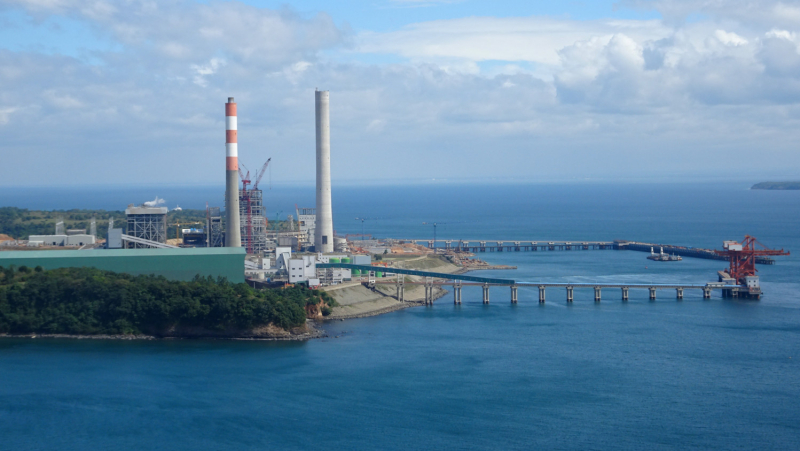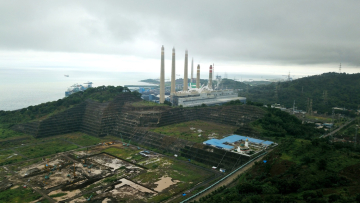
Project – On record
This profile is no longer actively maintained, with the information now possibly out of date
Project – On record
This profile is no longer actively maintained, with the information now possibly out of dateWhy this profile?
This profile covers 10 coal-fired power plants in the Philippines that are financed by Rizal Commercial Banking Corporation (RCBC), and were, among others, the subject of a historic complaint to the IFC's ombudsman in 2017 by the Philippine Movement for Climate Justice (PMCJ). These ten plants are also concrete examples of public and private sector banks' support for coal plants that are harmful to people's health and the climate, and a test case for how these banks remediate the harms of fossil fuel projects that they have facilitated.
What must happen
- While RCBC has announced a moratorium on new coal projects in the Philippines and committed to phase out its coal financing by 2031, the bank must strengthen and extend its coal policy positions to areas that are unmentioned in the current moratorium. Namely, RCBC must rule out coal projects outside the Philippines, lending and underwriting services, and corporate as well as project finance.
-
All commercial banks that co-financed the ten coal projects must engage with the IFC's remediation process and use their leverage with the coal projects’ developers to engage with the IFC’s environmental and social impact assessment and any recommendations for remedial action that result from it.
-
Commercial banks, both domestic and international, must Withdraw from Coal in the Philippines.
- Public financial institutions must close all fossil fuel financing loopholes allowing them to indirectly support coal, oil and gas projects via commercial banks as financial intermediaries.
| Sectors | Coal Electric Power Generation , Coal Mining, Onshore/offshore exploration, extraction or refining of Coal or Oil; |
| Location |
|
The initial, historic community complaint by the Philippine Movement for Climate Justice (PMCJ) to the International Finance Corporation concerned 19 coal power plants. Of these, ten were financed by RCBC and eligible for investigation by the IFC's ombudsman, the Compliance Advisor Ombudsman (CAO).
These ten plants were supported by loans from RCBC, international commercial banks and, indirectly, the IFC. The ten coal-fired power plants are:
-
the Masinloc plant expansion (660MW, pre-permit development),
-
the Dinginin expansion of the existing Mariveles Coal Plant (1300MW, operating),
-
the refinancing of South Luzon 1 & 2 units (also known as the Puting Bato power station) (2 x 135MW, operating),
-
the Quezon power station (1066MW, operating),
-
the Panay plant (135MW, operating),
-
Sarangani Province's SM200 (also known as the Kamanga power station) (210MW, operating),
-
the Lanao Kauswagan plant (540MW, operating),
-
the Toledo City project (also known as the Therma Visayas Energy Project) (300MW, operating),
-
the Limay power station (300MW, operating), and
-
the Davao San Miguel power plant (also known as the Malita power station) (300MW, units 1-2 operating, 3-5 cancelled).
Impact on human rights and communities
The impact on local communities across the Philippines of these plants has been severe, and has manifested in many different ways.
The Compliance Advisor Ombudsman (CAO), the IFC's watchdog, deemed the IFC to have failed to meet its environmental and social responsibilities, on the basis of its financing to RCBC and the knock-on impacts of that investment. The CAO summarised the following impacts on communities as "very likely or rather likely", as well as being of such a significant nature as to require “urgent assessment and mitigation" (p.29):
- "(i) adverse health impacts due to air pollution or water contamination from coal ash at six power plants
- (ii) impacts on livelihoods due to coal ash contamination at five power plants and due to physical or economic displacement at two power plants
- (iii) displacement and resettlement related impacts at two power plants
- (iv) threats against, and intimidation of, community activists in relation to four power plants
- (v) inadequate stakeholder engagement and consultation, including lack of grievance mechanisms, at all power plants"
Health impacts are a major public health issue arising from RCBC's coal investments. The Danao and Therma Visayas coal plants were included in a 2019 study by Greenpeace on the public health impacts of coal in the Philippines. The report estimated that coal plant emissions associated with these and other coal plants in the study could bring about up to 2,400 premature deaths in the Philippines annually. Greenpeace also produced findings in 2020 that said that up to 27,000 premature deaths per year may occur from fossil fuels in the Philippines in total. The initial complaint to the CAO by PMCJ and others testified to the range of health issues precipitated by the coal plants. These include respiratory issues, skin irritation, and other problems particularly affecting children.
Repression of peaceful opposition to the plants is a major issue. The Philippines is a dangerous place for land defenders and environmental activists, with 270 activists killed between 2012 and 2022, according to Global Witness. While much of this occurred in the mining sector, opponents of coal power have also been heavily repressed. Protests against the Masinloc plant, for example, which initially began operating in 1998, led to a high-profile case of a Greenpeace activist being beaten with a crowbar by guards of the plant. Further examples of human rights abuse, militarisation of plant security and repression surround Masinloc.
Further south, the Bataan province across Manila Bay from the capital has been a major area of coal power development for decades, and has seen severe human rights abuses for coal protesters. Gloria Capitan, a prominent anti-coal and sustainable energy advocate, was murdered in 2016 for her opposition to the Limay power plant, funded by Mizuho, Standard Chartered, RCBC and the IFC, among others, and developed by the San Miguel Corporation. Opposition by the Nuclear and Coal Free Bataan Movement (NCFBM), a local NGO with which Ms Capitan was associated, continues.
Livelihoods have been destroyed as a result of coal power development throughout the Philippines, including by these major coal projects backed by RCBC: people have been physically displaced, coal ash has degraded croplands and water sources and coastal areas have been contaminated, according to the CAO. In 2015, plans for the 600MW plant in Kauswagan prompted a widely-reported "Climate March" by local residents around the Lanao del Norte area, due to concerns about these factors. PMCJ, co-sponsors of the original CAO complaint, were co-organisers of the almost 600-km march, which sought to draw attention to the dispossession, health impacts and lack of community consultation in the Kauswagan planning process. The initial complaint also documented evictions for the Dinginin expansion at the Mariveles coal plant being compensated at as little as 50-100 pesos (about $1).
A full list of impacts to human rights, health and livelihood, including on a plant-by-plant basis, is on pages 31-34 in the original complaint.
Impact on climate
The combined emissions from RCBC-backed coal projects and others throughout the Philippines have resulted in severe climate impacts. At the same time, the Philippines consistently ranks as one of the countries most threatened by natural disasters and extreme weather. Climate change is also identified by the World Economic Forum to be the top risk to the country in the 21st century.
No robust audit of the plants' emissions per annum is available. However, the PMCJ complaint, the CAO's investigation, and the IFC's response to the investigation are all in agreement that the plants emit significant greenhouse gas emissions, and indeed in several cases operate using substandard and therefore carbon inefficient technology. As the PMCJ complaint points out (p.9, point 33), IFC commitments to audit the efficiency of the coal plants ignore the fact that any new coal-fired power is simply inconsistent with Paris Agreement mandates to drastically reduce emissions.
Significant appetite and cost incentives exist within the Philippines to fuel renewable energy investment, and the Centre for Energy, Ecology and Development (CEED), a powerful Filipino NGO, is advocating, with others, for a rapid decommissioning of the operating coal plants in the country.
Impact on nature and environment
Philippine Movement for Climate Justice (PMCJ)’s complaint to the IFC’s Compliance Advisor Ombudsman (CAO) documented severe degradation to freshwater sources, coastal waters, forests, and other natural environments from the coal plants' development, with knock-on impacts for people and animals. Continuous fly ash scattering has polluted rivers, lakes, croplands, and natural vegetation. The degradation of forests has curtailed grazing and resting areas for peoples' livestock. Artesian pump wells used by locals to irrigate croplands have dried up because of the water demands of the plants. Companies' failure to mitigate flood risk from land degradation led to the flooding of 300 households around the powerplant near Davao City. The Tino-Tampuan coral reef, a protected area near the Sarangani/Kamanga power station in southern Mindanao, has suffered from pollution. In 2017, residents in coal pollution-affected areas sued the Department for Environment and Natural Resources (DENR) for its failure to uphold environmental pollution regulations, including failing to update air quality standards or monitor air quality.
The financial information below has been gleaned from a variety of sources. In several cases, the information is partial because infrastructure and transaction databases (Refinitiv, Bloomberg, IJGlobal) provided confirmation of deals without finance data. For example, we will know that a financier has taken part in financing a coal plant, without knowing the exact dates or amounts of their contribution.
NB: all of the financiers below were not involved in all of the 10 coal-power projects, though most of these financial instutions did support several of the projects. Click on the description to see which plants each financier contributed to.
In 2022, Security Bank pledged to stop financing new coal power plants in the Philippines by 2033.
In 2020, RCBC committed to cease financing for new coal power projects in the Philippines, and said that its "remaining exposure to coal-fired power projects will be zeroed out by 2031". However, these commitments lack the detail and clarity for us to consider them robust coal policies, for example extending outside the Philippines, explicitly restricting corporate as well as project finance, and excluding other sections of the coal value chain (exploration, drilling, procurement, mining, etc.).
Most of the 10 coal plants were developed by special purpose vehicles and subsidiaries of large, diversified parent companies. Examples include San Miguel Corporation's energy arm, SMC Global Power Holdings, Aboitiz Equity Venture's ownership of two of the projects (Toledo City/Therma Visayas and the Dinginin Expansion of Mariveles) via subsidiaries, and Ayala Corp's involvement in two of the project (Dinginin and South Luzon 1 & 2) via its energy subsidiary, AC Energy Corp.


